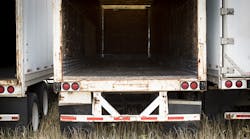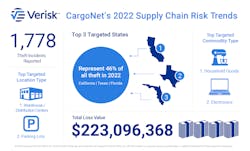Cargo theft is on the rise, but thieves aren't the only threat shippers and carriers need to overcome. Trucking stakeholders must ensure they have a plan in place to prevent crime, but also to work with law enforcement and to report thefts, so the industry as a whole has the information it needs to operate safely, according to freight risk management experts.
Supply chain visibility platforms such as CargoNet are only as good as their data, and that data is only accurate if a sizeable portion of thefts are reported, said Scott Cornell, transportation lead and crime and theft specialist at Travelers. Reporting cargo theft, however, is not mandatory. This results in an incomplete view of criminal activity, making it more challenging for theft experts and law enforcement to prevent and respond to crimes.
"Cargo theft is definitely underreported," Cornell said. "The 2022 CargoNet report was composed of 1,778 incidents. That's just a sample size of people who reported to CargoNet, so take those numbers as a man-on-the-street poll," he said, calling pilferage—the theft of partial loads of cargo—"tremendously under-recorded."
A principal reason theft goes unreported is because companies fear publicity that could damage their brand.
"Companies don't want to be seen as having a lapse in security," said Danny Ramon, intelligence and response manager at supply chain risk management company Overhaul. Ramon also said he thinks strategic theft—when thieves use fraudulent or stolen carrier or driver identities to book and then steal loads—is likely the most underreported.
See also: As cargo theft continues to rise, experts advise on prevention and spotting fraud
There are also situations where companies might not be sure if cargo loss is theft or simply an oversight. Lewis gave the example of a missing pallet: Is it stolen or missing? What if a pallet is missing only one box?
Although companies likely would never call the police over that, Lewis said it would still be helpful to be reported as missing to CargoNet to get another data point on the map, adding that you don't have to be a member to report to CargoNet.
It's important to have a plan before theft occurs, Cornell said. If truckers have a brokered load stolen, he explained, they will likely call 911 and then their dispatch. And if, for example, it happens late on a Friday night, a carrier might try to deal with it on its own first before contacting the broker of the load.
"Delayed reporting is a big problem because, beyond 24 hours, chances of recovery go way down," Cornell said at the 2022 Truckload Carriers Association Safety & Security Meeting in Nashville.
Cornell said thieves using fraudulent identities are often good at hiding the theft for a few days before it is discovered. He gave the example of a theft that occurs on a Friday afternoon when a load is not planned to be delivered until Monday. Without proper asset tracking or contact with the driver, the cargo can be long gone before anyone realizes it was stolen in the first place.
Working with law enforcement to prevent cargo theft
When it comes to a plan in the event of theft, Ramon quoted a saying among theft experts: "If you're calling 911, you've already lost."
Ramon clarified that, although victims of theft should call the police, most officers are not specialized in cargo recovery. Victims need to know whom to call in their jurisdiction, whether that's a task force or, more likely, a state trooper or officer who knows what department might be able to respond rather than 911 dispatch, which will prioritize violent crimes over property crimes.
Ramon recommended having resources outside of law enforcement, such as an insurance or supply chain management company that employs cargo theft experts.
See also: 'Pilferage' now the crime of choice among cargo thieves
Keith Lewis, CargoNet's VP of operations, who worked on a cargo theft task force for 15 years at the Georgia Bureau of Investigation, said today's dearth of police cargo theft task forces started over a decade ago.
"We stole from the future back in, say, around 2008 or 2009, where a lot of these law enforcement agencies had hiring freezes. You have a hiring freeze for one cycle of a police academy, and in five years, you're going to pay for that tremendously. So there's a big shortage of officers, so there's only so many to go around. And so, the task forces were almost like a luxury item."
And the task forces that still operate, Lewis said, are less specialized than they were years ago. When working on a task force at the Georgia Bureau of Investigation, he investigated only cases where cargo was stolen—stolen trucks or trailers went to the auto theft unit. Now officers are spread so thin that members of a task force are often working on human trafficking cases—because of how much occurs at truck stops—or even homicides.
Lewis did say, however, that due to fluctuating budgets and changing priorities, there is a possibility that some of the disbanded cargo theft units could come back.
When connecting with local law enforcement, "Dig your well before you're thirsty," Lewis said. He suggested National Law Enforcement Appreciation Day in January or National Police Week in May as events that would be good times for trucking companies to connect with police.
"Call the local police department and talk to their public information officer—every agency now has a PIO. Say, 'Hey, can we come out to your roll call and explain the business?" A lot of times, it's the nomenclature of the business. We don't need to teach these guys how to investigate crimes. They just need to understand the business and how it works."
One thing the industry needs to explain to police, Lewis said, is that strategic theft, even when a fraudulent driver is carrying the bill of lading, can be a criminal case. Police often see missing cargo, in the case of strategic theft, as a civil matter, not a criminal one.
"To me, it's theft. It's theft by conversion," he said. "You legally gave it to them, they took it, and then by not delivering it, they converted it to their own property."
However, this is complicated in the case of double-brokered loads, when the chain of custody stretches so far that the original shipper may have no idea who has the freight at any given time. In these cases, the question of who is to blame comes up, which can become a civil matter, not a criminal one.
"What if that carrier gave it to another carrier, that gave it to another carrier, where we get into these triple, quadruple brokering loads? Who's really the villain here? Who really committed the crime? They've delivered, and it was five pallets short … how do you know they stole it? And then it's a civil matter," Lewis said.






